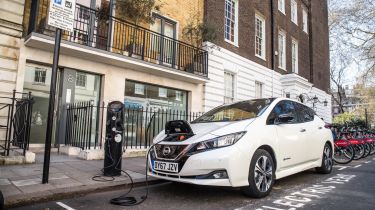Electric cars produce less lifetime CO2 than internal combustion vehicles
Studies have found that the lifetime CO2 output of an electric car is less than that of petrol and diesel models

According to Belgian clean transport campaign group Transport & Environment (T&E), the average electric car produces three times less CO2 during its lifetime than an equivalent internal combustion car. T&E also suggests that over the course of the next few years, the decarbonisation of the EU economy will help electric cars reach overall emissions levels four times less than conventional cars by 2030.
The study, published in April 2020, used up-to-date real-world emissions figures for internal combustion cars, while also taking into account realistic lifetime mileages for electric vehicles and recent carbon emissions data for electric car battery production.
According to the study, the UK’s electric cars produce less CO2 than those in Poland, Germany, Italy and the Netherlands; in the UK electric vehicles produce 62% less CO2 over their lifetime than the average petrol or diesel car.
The study claims that the average medium-sized electric car sold in 2020 emits around 90g/km of CO2 over its lifetime – taking into account battery production, car production, and electricity subsequently needed to run the car – with a diesel car responsible for 234g/km, and a petrol car 253g/km.
Transport & Environment also suggests that in a best-case scenario – where electricity to produce the battery and run the car is provided largely from renewable sources, such as in Sweden – an electric car’s lifetime CO2 emissions will be five times less than a diesel, or 5.4 times less than a petrol.
The study also provides a worst-case scenario, whereby an electric car is produced in China and delivered to an EU country with a largely fossil-fuel driven electricity grid, such as Poland. T&E suggests that while in this situation an electric car would be responsible for 41 tonnes of CO2 over its lifetime, this figure would still be 22% or 28% less than its diesel or petrol equivalents respectively.
Electric car lifetime CO2 – a previous study
Previously, university research published in the scientific journal Nature Sustainability also suggested that electric cars have a lower overall carbon footprint than those powered by petrol. The research was carried out by scientists from Cambridge, Exeter and Nijimegen universities.
The study, which also compared domestic electric heat pumps with gas boilers, found that both around the world and in individual countries, the CO2 emissions of petrol cars and gas boilers were higher than those of electric cars and heat pumps. The study found that in 95% of the world’s countries, electric cars and heating pumps work out as ‘cleaner’ than their fossil-fuel alternatives, but not in the remaining 5%, where coal-fired power stations are still the main source of electricity.
Countries that use the least fossil fuels in their electricity production, like France and Sweden, see electric cars make CO2 savings of up to 70% versus their petrol counterparts, according to the study. The UK’s saving here is about 30%, a figure that should increase as our national grid turns more towards renewable energy.
Previously, a study commissioned by Drax Electric Insights and carried out by Imperial College London in 2019 found that an electric vehicle produces half the CO2 emissions of an internal-combustion car when taking the vehicles’ production and full lifetime into account.
The study found that after two to three years of running, the zero local emissions of the most efficient electric cars would compensate for the carbon emissions of their batteries’ production. However, the study states that smaller electric cars with smaller batteries are best in this regard, with the largest models taking up to three times longer to account for the increase in carbon emissions from their production.
Researchers found that as the UK continues to decarbonise its electricity as it works towards its wider 2050 net-zero emissions target, electric cars will become increasingly kind to the environment.
“EVs have real potential to reduce our carbon footprint and help meet our net-zero carbon ambitions, despite some speculation about how clean they really are,” stated Dr Iain Staffell from Imperial College London.
“An electric vehicle in the UK simply cannot be more polluting than its petrol or diesel equivalent, even when taking into account the upfront ‘carbon cost’ of manufacturing their batteries. The carbon content of Britain’s electricity has halved in recent years and keeps on falling, whereas conventional engine vehicles have very limited scope to reduce emissions over their lifetime.”